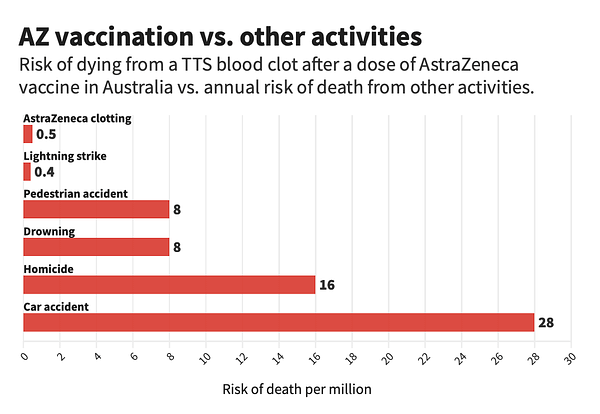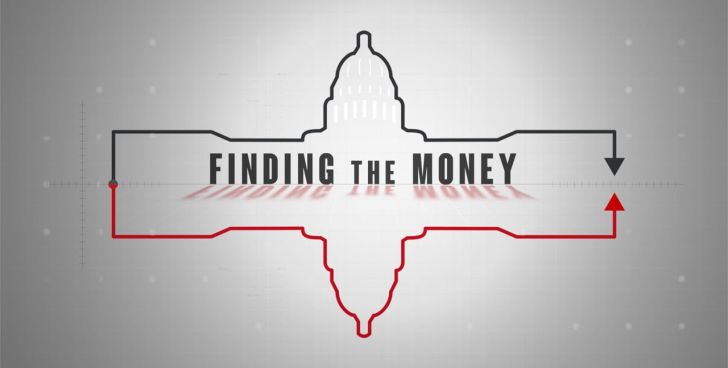

Discover more from Fresh Economic Thinking
My COVID story - Part 2
As the world's fascination with COVID finally wanes, I reflect on my experience of the insanity
Read My COVID Story - Part 1 here.
January 2021 - Sticking with the crowd
I was approached to write a short piece for The Mint magazine. I sent a rough draft of the type of article I would write. When it dawned on them that I was going to challenge the COVID mantra they decided that they must stick with the crowd and not publish anything.
I later put that draft piece on my blog. The predictions in it have been quite accurate. Take a look.
Back then, zero COVID was still a thing that people thought was possible, despite all evidence. The vaccines were going to be the way to achieve that dream.
June 2021 — Vaccinate the kids becomes a thing people want to do
I was invited on ABC’s Q+A television program to be a panellist sharing opinions about COVID policy. You might be wondering how someone gets invited. My experience was that Stan Grant and the producers wanted to be able to say that our reaction to COVID was overblown but didn’t want to have to say it themselves and cop the flak.
Here’s a write-up about that appearance from ABC News.
I was asked about vaccinating children. I said
We know this virus is a thousand times worse for elderly people than the young and we don't need to vaccinate 100 per cent of the young people before we open up.
That's an imbalance of risks.
The only epidemiologist on the panel was the most wrong person. But again, being truthful or accurate is not rewarded. Preaching to the crowd is.
“Can I speak as a public health expert and not an economist," Dr Lokuge, an associate professor at the Australian National University, said.
"What we are aiming for is a level of vaccine coverage that means we are not going to get to high levels of transmission."
Australia had its worst COVID outbreak by far in Jan and Feb 2022 after being over 90% vaccinated. It seems like there was no vaccine coverage level that stops high levels of transmission, despite what the “experts” were saying.
On vaccinating kids I said on the program that it wasn’t worth it, only to be rebutted with what ended up being a strange agreement from the Australian Medical Association President Dr Khorshid. He said I was downplaying risks, but then concluded that, yes, there appears to be no clear benefit from vaccinating children and that is why they are not currently recommended.
They're not going to vaccinate kids to protect us or older Australians. They're getting to vaccinate kids if it's good for the children themselves.
What was interesting is how many people contacted me after the program to support what I was saying and explain how they were censored in their professions and that the health costs of lockdowns have been very real.
My reflections on Q+A and the fallout are here.
One thing I realised after that experience is that people have no idea where longevity comes from, so it makes sense to focus only on the immediate threat of COVID. They can’t see how economic dislocation can cost lives. So I wrote this piece to explain how our daily lives, all those economic and social interactions, are a great big “longevity machine”.
July 2021 - Quarantine theatre
The highlight of my eldest son’s year is the State basketball championship. It was scheduled for the mid-year school holidays. But more panic over a few COVID cases meant that the event was cancelled.
When the kids got a bit of a cough (remember this is mid-winter in Brisbane with those dry cold westerly winds) we decided that to keep others calm we should get the kids tested.
We couldn’t find the end of the local drive-through testing queue. So we decided to go first thing in the morning to the children’s hospital, which had a relatively quiet testing facility. We were the first people there at 7.30 am and got in and out quickly with a negative test result coming the next day.
A couple of days later I got a call. It turns out that the people behind us in the queue at the children’s hospital tested positive for COVID. My whole family became classified as “close contacts” and needed to quarantine at home for two weeks. We could only leave to go directly to a testing centre so that we could get a negative test to end our quarantine.
I was pissed off. I tried to make the most of the time by painting the front room and doing some home repairs. But the whole theatre of it felt so ridiculous, especially when armed police came to make sure we hadn’t gone anywhere. Remember, we only stood somewhere in the vicinity of someone with COVID for a few minutes. That was the crime for which home detention was the punishment.
Looking back on this from 2022 it seems extraordinary. Yet the majority of people at the time thought it was a sensible way for society to function.
August 2021 - “Cam, honestly, what are you doing with this stuff?”
The vaccine rollout was in full swing, with vaccine passports transitioning from conspiracy theory to reality in record time.
People rightly became concerned about vaccine side effects. I know people who had bad reactions, some with myocarditis and long hospital stays. It was hard to deny when journalists were posting to social media from their hospital beds, but many seemed motivated to ignore this evidence.
The funny part of this period was how those who would never take the rushed “Trump vaccine” in late 2020 turned on a dime to criticise anyone who wouldn’t take the very same vaccine that could now be called a “Biden vaccine”. Politics, COVID, and vaccines became united as a single personal identity that was surprisingly popular, especially with blue checks on social media.
Again, facts didn’t matter. One big claim that did the rounds was that vaccine side effects are as rare as being struck by lightning. It didn’t matter that the figures were wrong a factor of ten. They were wrong the way the COVID crowd wanted them to be.


I wrote about that period here. Again, I made a few predictions that were quite accurate.
There will be a time in the next two years when Australia has a much bigger COVID outbreak than any yet despite being hugely vaccinated. Depending on the political fallout from 2021 we may even collectively take no action. No masks. No lockdowns. No border closures.
Australia will see a year with a 7% increase in all-cause deaths (about 10,000) in the next decade and no one will notice. Given the ageing population and the normal variation in deaths each year, this makes sense. I’m actually being intentionally bold on this prediction. Realistically a 5% increase (7,000 extra deaths), or 134 extra deaths per week, is more likely to be observed.
Vaccine passports of some sort will be enacted against all evidence. They will be cheered by the mainstream media as they justify all the terrible policies the public health army has forced onto us so far. No one will care that the vaccines wear off or that the vaccinated transmit the virus to a similar extent after six months or so. The public health army will march on from the vaccine race song to the vaccine passport song, to whatever else keeps the marching going.
Predictions 1 and 3 are true. As of March 2022, borders are open, lockdowns are not happening, masks are gone, and the country just had its biggest COVID outbreak yet.
January 2022 - Psychological scars
I had COVID in January 2022. For me, COVID is over. I was double vaccinated. I took the two doses six weeks apart, longer than recommended, but a healthier choice if I go by the medical evidence.
It was a sore throat for nearly a week. That’s it. Sure, I had little energy or focus. But I’ve had many worse colds.
My kids had COVID too. They were unvaccinated. A sore throat and temperature for a day. Then a few days to regain their full energy. They’ve had many worse colds.
My wife was triple vaccinated and her symptoms were about the average of mine and the kids.
COVID is over at my house. But the psychological legacy remains.
After we had all recovered I arranged for my sons to hang out at their mate’s place, where they often do, but hadn’t visited for a few weeks. My youngest son seemed less enthusiastic than normal. I thought maybe he wasn’t feeling well. After all, he’d had COVID a week prior.
When we were thirty minutes from leaving the house he went and hid in his room and cried. He didn’t want to go.
It took my wife a while to find out what was happening. It turns out, he was scared that he might still be contagious, and since the family he was to visit were quite cautious about COVID, he didn’t want to be blamed if they later caught it.
March 2022 - It’s over
Australia is late to the party, but COVID is over here now, as it seems to be in most of the world. Many countries have ceased monitoring, ceased emergency powers, and are totally ignoring COVID as they should have from the beginning, despite record outbreaks.
In some places where the reactions have been most severe, the need to save face has generated more ridiculous and contradictory rules about masks, gatherings, vaccines, and travel. Canada comes to mind, but Australia has this problem too.
This also means that the stories being told by the COVID crowd must evolve. Reasons must emerge for COVID to now be less scary than before and to justify two years of panic. This must be carefully managed in order to avoid potential retribution for political insiders who used their powers unnecessarily and with a huge cost to human wellbeing.
I have shifted to Substack because the censorship on social media has ramped up so much that it is not clear whether saying true things is enough to keep your audience. My 9,000 Twitter followers have been of great value to me—sharing ideas, news, and expertise with me for years. I like the conversation and it has created a public profile for me that has helped me influence public policy in a useful way. Please subscribe here to keep the conversation going.











Thanks for sharing your knowledge with the public..now if only more people would listen!
Enjoyed your article and will likely follow you closely going forward.
One criticism is that you speak of COVID being over for all Australia, ignoring the fact that sadly WA is lagging and once again earning our Wait Awhile reputation. Very recent easing of NSW and Vic restrictions is reason for optimism, but I'm not convinced we'll see WA follow soon enough and completely enough. I'd love to hear your thoughts.